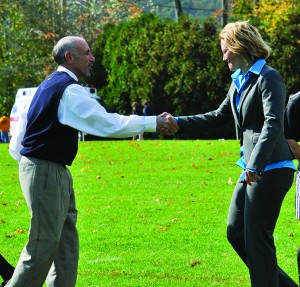
Quinnipiac head coach Becky Carlson and Eastern Illinois head coach Frank Graziano were rivals on Alumni Field Saturday afternoon, as they squared off in the second-ever Division I women’s rugby matchup. Off the field, the two are teammates.
Carlson and Graziano are best friends and have been working together to make women’s rugby a more prominent NCAA sport.
“We’re hoping that the product we have going out on the field with the two teams is something that we can market to other universities,” said Carlson, who played under Graziano for four years and coached with him for three.
Carlson and Graziano speak almost daily. They talk about almost everything, but a lot of the time they talk about their rugby programs and how the sport can benefit.
“I think we make a pretty pair about trying to not only make our programs better, but how to move the sport forward,” Graziano said. “Obviously we have an enormous responsibility to begin to create the future for this sport.”
Before Carlson ever got involved in rugby, she was a multi-sport athlete in high school and originally played only tennis at West Virginia. She found out about Eastern Illinois having the inaugural NCAA women’s rugby program from a USA Today article.
“I actually called (Graziano) up and was like, ‘I’m interested so what’s going on?’” Carlson recalled. “I liked the idea of it being a pioneering thing. I liked the idea that he was recruiting a new brand of the sport and I like to be there when things are at the beginning. I think that’s exciting and we’re doing that here now at Quinnipiac.”
After taking an official visit to Eastern Illinois and speaking with both Graziano and the tennis coach, Carlson transferred. She played both tennis and rugby for the Panthers before she decided to commit to rugby for her final year of athletic eligibility. Carlson scheduled four hours of practice each day – two for rugby and two for tennis.
“It was an experience that not many people could say they did,” said Carlson, acknowledging the exhausting days. “I look back at it now and I wouldn’t take anything away from it. It was great.”
Carlson worked as an assistant women’s soccer and women’s lacrosse coach in 2004 before she returned to her alma mater to work alongside Graziano.
“When she was my assistant that’s when she really started to get involved in the game,” Graziano said. “I think she just has a natural instinct for sports, especially field-type sports in general, so rugby became a very natural sport for her to pick it up and she’s caught on ever since. She just soaks it up like a sponge.”
Carlson left the program in 2006 for a job at USA Rugby, where she was the emerging sports program manager. That job allowed her to try to develop women’s rugby programs for more than 30 colleges. She correctly believed she could do more by being in charge of promoting women’s rugby a for USA Rugby than she could by being an assistant coach at Eastern Illinois.
Carlson, Kristin Richeimer and Amy Rusert founded Varsityrugby.org, a non-profit organization that caters to high schools and colleges to create proposals to take a look at women’s rugby as a varsity sport, according to Carlson.
“It takes time for schools once they become interested,” Carlson said of getting more high schools and colleges to establish their own women’s rugby programs. “It’s going fairly well.”
While there is a lack of high school rugby teams in the country, Carlson said a lot of recruiting is based on finding well-rounded athletes.
“There are so many combined talents in rugby that you’re able to combine and put it together,” Carlson said. “This sport is able to welcome with open arms those crossover athletes that have the ability to channel all of their talents in each sport where they may not be the best at it … I do look to soccer, basketball and track athletes who have that combined skill and I want to recruit those kids.”
Carlson used to play tennis, baseball, soccer, track, strength and conditioning in high school, and took up rugby because she “missed that aspect of having that combined opportunity in all those sports.
“The majority of the rugby community is made up of crossover athletes who are finding the sport, which is nice. It would be nice to get it younger and get it in their hands, but that’s where all the interscholastic and intercollegiate stuff comes in.”
Graziano and Carlson play each other three times this year, what Carlson calls the “Two-Cat Series” since they are the Panthers and the Bobcats. But at the end of the day, the two head coaches are friends and pioneers.
“While the game has sort of developed a bit into a rivalry to some extent, we’re still partners,” Graziano said. “We’re the ones who are developing the sport and sort of creating the future for all of this.”














